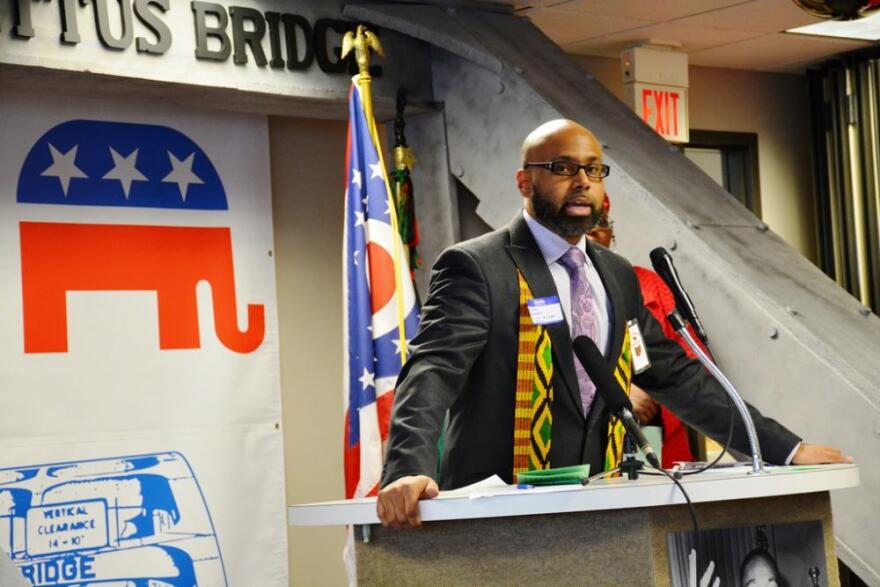by Nick Castele
At the Cuyahoga County Republican Party’s celebration of Martin Luther King Day, the audience of about 130 is a mix of Republican officeholders, candidates and supporters, black and white. There are even a few Democrats here—and patriotic singing.
Brian Barnes, the co-director of African-American Initiatives for the Ohio GOP, leans into the microphone and tells the audience he’s been given a charge by the party.
“And that charge was to utilize, or rebuild, the bridges that had been abandoned over the years,” Barnes says. “You see, the Republican Party had written off our community for some time.”
Organizers are relying heavily on that bridge metaphor. Surrounding the lectern is a large model of the Edmund Pettus Bridge in Selma, Alabama, where in 1965 Civil Rights marchers were beaten by state troopers.
The event is part of a larger effort to find black voters who see eye-to-eye with Republicans in one way or another. Republican margins of support with African-American voters have remained low over the course of several presidential elections, while the party has won majorities among whites in recent contests.
President Obama carried 93 percent of African-American voters in his reelection bid—and those margins in Ohio cities helped him secure victory here. In some Cleveland precincts in 2012, Mitt Romney won zero votes. But the party did do better with African-Americans in 2014.
Now, as the GOP prepares for its convention in Cleveland, it’s trying to turn the page with African-American voters. Orlando Watson with the RNC says they’re keeping tabs on who might be more likely to vote GOP.
“We’re strengthening relationships with black Republicans, rebuilding relationships with voters who may have voted for us in the past but not recently, and reaching out to new voters who we think we can find common ground with,” he says.
The party hopes to find common ground with some voters on issues like supporting charter schools and school vouchers. Watson says the party also wants to reach younger voters, particularly on historically black college and university campuses.
Last summer, the party launched a campaign called “Committed to Community,” with a goal of attracting black voters. The GOP began airing ads on Radio One—a major national media network geared toward black audiences.
Jason Johnson, a professor at Hiram College and politics editor for The Root, doubts that this year’s Republican presidential candidates will be able to recover the double-digit margins of support the GOP once received among African-American voters.
He said major policy issues, such as support among Republicans for voter ID laws, separate the party from many black voters. Plus, he said, the rhetoric of Donald Trump doesn’t help the party branch out.
“And that’s going to stick with black voters,” he told 90.3’s the Sound of Ideas. “You can’t sell people at the local level on a party when the top of your ticket is expressing policies and values that people find offensive.”
Last year, RNC Chairman Reince Priebus visited Cleveland. Hosting him was LaVerne Jones Gore. She’s run for office as both a Republican and a Democrat, and says she backed Barack Obama in 2008. She says it was refreshing to hear Republican leadership talk about building a diverse party.
“It shouldn’t have been, but it was,” Jones Gore says, laughing. “No, it shouldn’t have been refreshing, and it shouldn’t have been new.”
She says people from other political campaigns have called her, asking how they can best reach black voters. That surprises her.
“I’m just startled that so many people don’t understand,” she says. “Okay, so, what does the African-American community want? We want what every American community wants.”
For her, that means good schools and income, safe communities—and she’d like to hear the GOP talk more about police. Jones Gore says she wants to see both major parties compete for African-American support.
And in exchange for votes, she says, “I’d like policy, policy that’s realistic. Come into our schools, come into our neighborhoods.”
The Ohio Republican Party says it has two staffers who’ve been working on African-American outreach since 2014. And the GOP enlisted local activists to help build up their organization.
In Cleveland, a group called the “Inner-City Republican Movement” put together last month’s King Day event. Leading the group is an activist named Donna Walker-Brown, who says she’s trying to talk with Cleveland voters.
“Sometimes we don’t have a full room, but at least we have a half a room full,” Walker-Brown says. “And just the fact that even if you have 10 and five listen, that’s a plus for me. I feel as though it’s all about getting the message out.”
A message, she says, the focuses on the free market, family values, education, workforce development. Walker-Brown says she’s not trying to change the votes of staunch Democrats.
“That’s air I could be using for someone who’s an independent, or someone who’s not satisfied,” she says. “I’m more spending time with someone who’s a disgruntled Democrat, with the judicial system here in the city of Cleveland.”
She says she wants to reach people who are frustrated with local Democratic leaders.
The question is how many of those voters would consider a Republican candidate. This summer, the GOP aims to find out, saying canvassers will spend more time working in black communities.
The party hopes that by consolidating the support it already has, and having conversations with other voters, it can begin to perform better than it has the past eight years.




